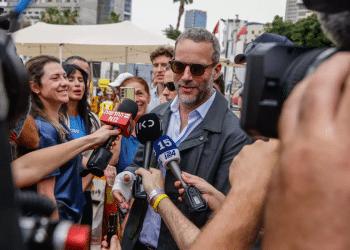The government is considering placing the ultra-Orthodox city of Bnei Brak under quarantine, over its residents' defying of the nationwide curfew orders and the fear that the coronavirus outbreak could spiral out of control in the densely populated locality, where the infection rate is higher than the national average.
Finance Ministry Director Shai Babad told the Knesset on Sunday that "we are having more than a few problems with ultra-Orthodox society in areas like Bnei Brak."
Follow Israel Hayom on Facebook and Twitter
Babad made the comment hours after hundreds of residents gathered for the burial of Rabbi Tzvi Shenkar, with thousands reportedly attending a funeral procession just before. Videos show hundreds gathering in close proximity to one another, breaking social-distancing directives.
Several clashes between residents and police attempting to enforce the lockdown have taken place in ultra-Orthodox neighborhoods in recent weeks.
The images sparked criticism of the police, who were accused of not enforcing the directives as vigorously as they do in secular cities.
Public Security Minister Gilad Erdan said he "would not stand for it," and demanded the police exercise "determined and equal enforcement of Health Ministry orders throughout Israel, with no exceptions."
Prime Minister Benjamin Netanyahu has instructed Interior Minister Aryeh Deri to devise a solution that would enable the ultra-Orthodox population, as well as the Arab sector, to observe Health Ministry directives while considering their specific needs.
Last week, Health Ministry data showed that 24% of infections have occurred in synagogues, with the next most common places of infection being hotels (15%), restaurants (12%), supermarkets (7%), yeshivahs (5%) and medical clinics (5%). Educational institutions, senior facilities, daycares, mikvahs, election ballot stations, shopping malls, event halls, and gyms all fell under 5%.
The data further showed that in Bnei Brak, cases of infection are increasing eightfold every three days, compared to the twofold national average. In Jerusalem, which also has a high ultra-Orthodox population, the cases are quadrupling in the same time period.
The Knesset discussion of a potential full lockdown, said Babad, is centered on "how we could put a closure in place and isolate those areas," referring to the ultra-Orthodox areas with high infection rates and non-compliance with government orders intended to decrease the spread of the outbreak.





